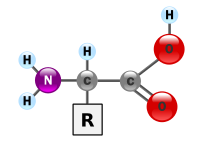
Photo from wikipedia
BACKGROUND A hydrolyzed protein composition is a mixture of peptide and amino acids that have been achieved through hydrolysis by the enzyme from different sources, acid or caustic soda. These… Click to show full abstract
BACKGROUND A hydrolyzed protein composition is a mixture of peptide and amino acids that have been achieved through hydrolysis by the enzyme from different sources, acid or caustic soda. These peptides show important health improving properties including anti-oxidation, antimicrobial, anti-cancer, anti-diabetic, anti-hypertensive activity. METHODS The aim of the present study was to hydrolyze the protein extracted from medicinal pumpkin seed (Cucurbita Pepo Con. Pepo Var Styriaca) seed meal by pepsin enzyme to obtain bioactive peptides with the highest antioxidant capacity. For this, response surface method (RSM) and central composite design were used at different enzyme concentrations (1%-2%), hydrolysis times (2-5 hours), and temperatures (30-40 °C) as independent variables. Then, the functional properties (emulsifying capacity, foaming capacity, water absorption capacity, and oil absorption capacity), heat and pH stability, and amino acid analysis were measured for the optimum treatment. RESULTS 2,2-diphenyl-1-picrylhydrazy (DPPH) radical scavenging capacity of peptides achieved in optimum conditions (82.07%) was highly similar to the results predicted by the software (80.31%) and their functional properties were significantly different from the initial protein (P > 0.050). Amino acid profile showed that the antioxidant capacity of the hydrolysates could be due to the total hydrophobic amino acid content that accounts for 39.85% of total amino acids in pumpkin seed meal. CONCLUSION According to the results, pumpkin seed meal hydrolysates, with outstanding functional properties, can be used in different food formulation to improve their physical and chemical properties and extend their shelf life, and as antihypertensive and antioxidant agents in the prevention of cardiovascular disease.
Journal Title: ARYA Atherosclerosis
Year Published: 2019
Link to full text (if available)
Share on Social Media: Sign Up to like & get
recommendations!